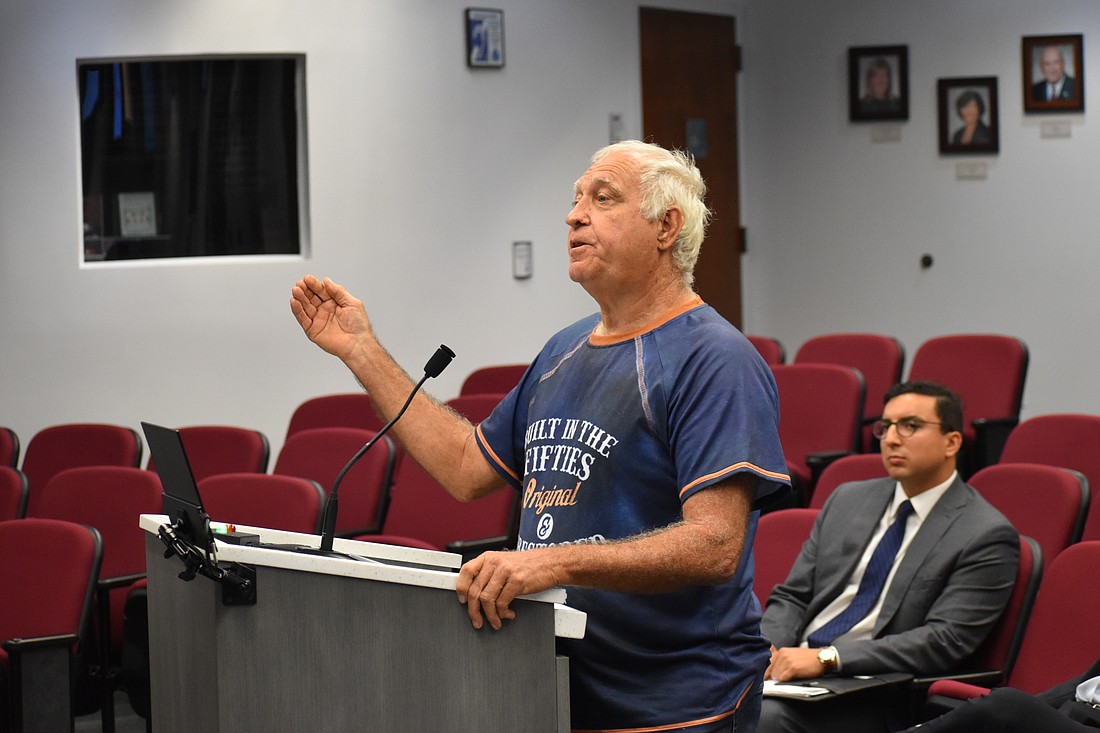- January 3, 2025
-
-
Loading

Loading

After voting to approve a developer's request for an increased density bonus just to the north of Lakewood Ranch on State Road 64, Manatee County Commissioner George Kruse said at an Oct. 6 land use meeting that changes are needed.
Kruse said current county requirements force commissioners to approve development bonuses that are meeting requirements that basically favor attempts to build walkable communities, but he said, in reality, that goal is seldom realized.
“We hear these things like 'Oh, this is mixed-use, it's livable, it's walkable," Kruse said. "People can work there and shop there, and they're going to walk around a corner and get their eggs and their milk. That virtually never happens.”
Currently, county policy allows developments up to 20 dwelling units per acre, in cases where at least 75% of the project’s frontage borders an area considered a node of activity, which might include commercial areas featuring shopping and services.
A developer can also designate 25% of dwelling units as affordable housing to achieve the same density increases.
During the meeting, Kruse and Glen Gibellina, a spokesperson for the affordable housing advisory board, took aim at the former requirement.
The development being considered — it was unanimously approved by the commission — is a new apartment complex by Eastern Meridian Property Group, located just east of the Hide-Away Storage facility at the southeastern corner of Lorraine Road and State Road 64.
Philip DiMaria, a certified planner with the engineering firm Kimley-Horn, called the project a different type of addition to the area that would contribute to the diversity of housing options. He said the planned amenities, which include a spa, fitness center, and yoga studio, would be “very high-quality,” while the environment would be “walkable,” featuring street trees for scenery.
The development is planned to include 350 multi-family units, as well as five commercial outbuildings.
The site, which is currently zoned in separate sections for general commercial and general agricultural uses, is set to be rezoned to the category Planned Development–Mixed Use. The rezone will raise the number of allowed units from 84 to 208, and to 462 including the density bonuses.
Approved concurrently was a request to change the Future Land Use Category of the property from Urban Fringe-3 to RES-9 to allow residential development. DiMaria said this change would add additional density, while limiting commercial uses to neighborhood-serving ones.
DiMaria said the change of category would generate less traffic than what could originally have been drawn there.
He called the development an excellent fit for the surrounding area, noting features in the surrounding area including a 7-Eleven to the northwest, and a similar project at Uihlein Road to the southwest.
However, Gibellina criticized the density increase, noting the unit prices, which ranged from $1,295 to $8,432 a month.
Gibellina asked commissioners not to grant a density increase for a project he said would not fulfill the purpose of doing so. He said he did not see its benefit to a region that needed housing for young professionals, teachers, first responders, and healthcare workers, and called instead for studio apartments and one-bedroom apartments.
“I don't see it, and you shouldn't see it either,” he told commissioners.
According to the applicant’s presentation, the property would have contained some one-bedroom apartments, in addition to two and three-bedroom apartments.
Gibellina proposed a rule that would allow developers who did not want to build affordable housing, to obtain a density increase at a cost of $25,000 per unit, with the county then able to use those proceeds to purchase affordable housing in another area.
“We've been given bonuses out like candy,” Gibellina said. “It’s time to draw a line in the sand and say enough is enough, they're not entitled to it unless the county and the citizens get something back.”
Despite voting in favor of the project, Kruse agreed with Gibellina’s comments, including his calls for a fee for developers, while calling for the county’s requirements to be changed.
“People use the mixed-use to get around having to build workforce housing,” he said, stating that he had been pushing for this to be changed since he was elected in 2020.
Kruse said the construction of 116 workforce housing units would have provided enough density bonuses to allow 346 additional units on the property, only slightly less than the planned 350.
He said therefore, large numbers of affordable housing units were being sacrificed.
Kruse said prior locations in the county that had been purported to provide mixed uses were not fulfilling their intended purpose.
He said one example was Summerhouse Apartments along State Road 64 in Lakewood Ranch.
“Sure, if you need lotto tickets or anything of that nature, you’ve got the Circle K," he said. "But I don't think that was the intent when it was presented. Nor is that the intent here.”
Commissioner Carol Whitmore said she does not believe any changes need to be made for how density bonuses are granted. She said the market had shown a demand for multi-family dwellings.
“With all due respect, we have many young people moving into this town, and they do not want a house,” she said.
Whitmore said it was too early to claim that certain areas will not serve the mix of uses they were promoted as providing.
“Infrastructure follows rooftops,” she said. “Whether we love it or hate it, development is creeping into East County, because (the western part of) the county is saturated and full.”